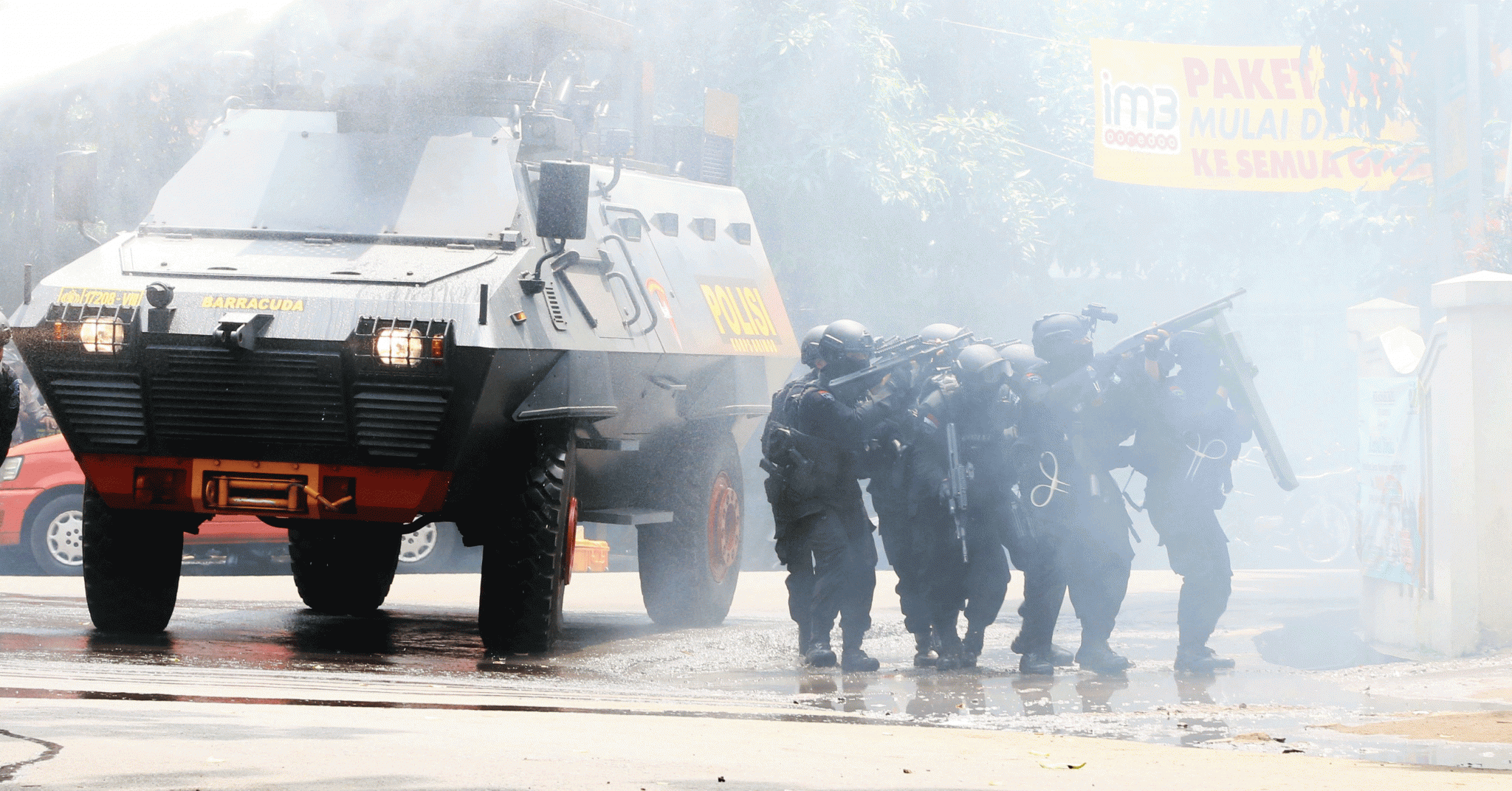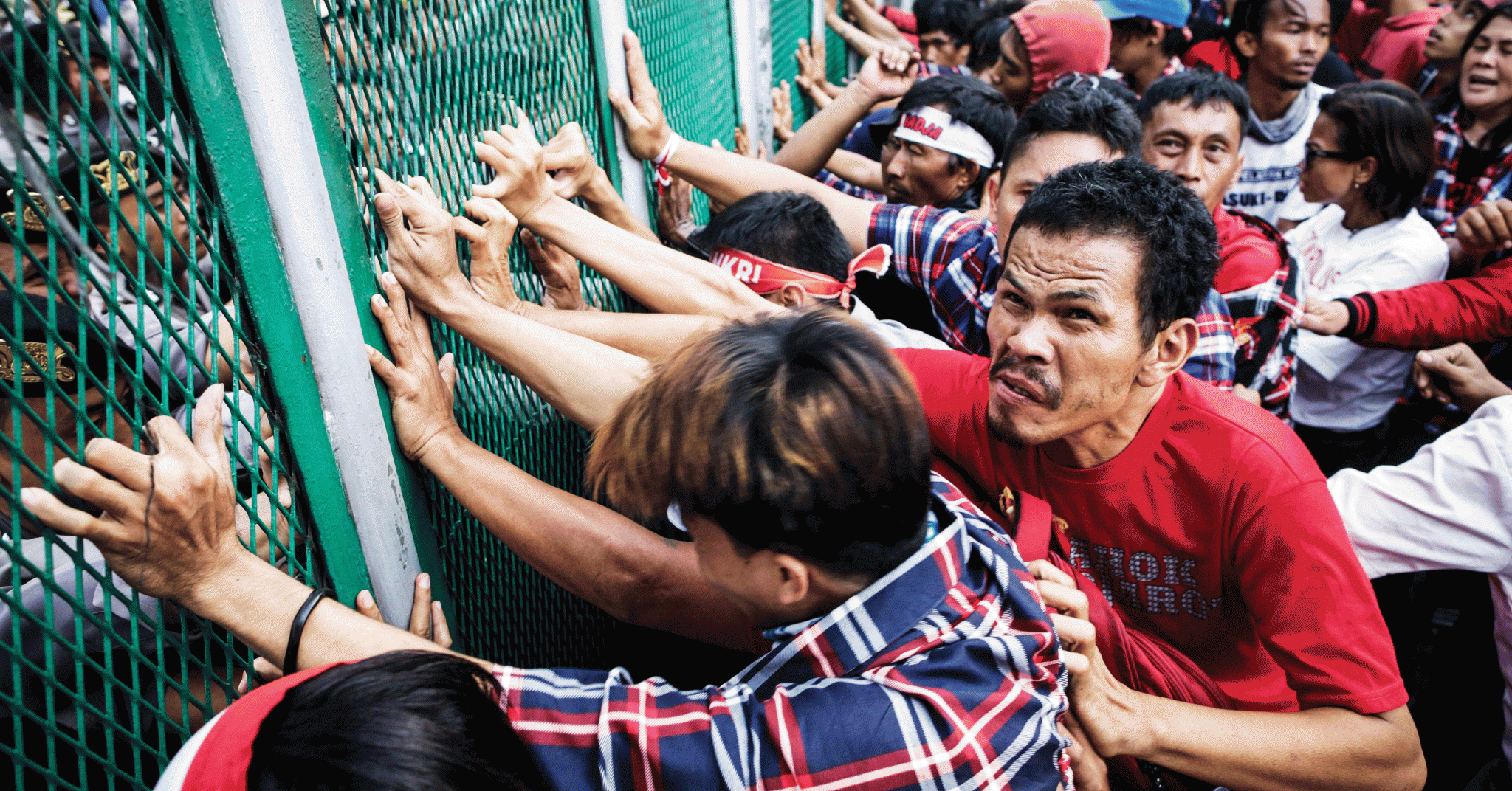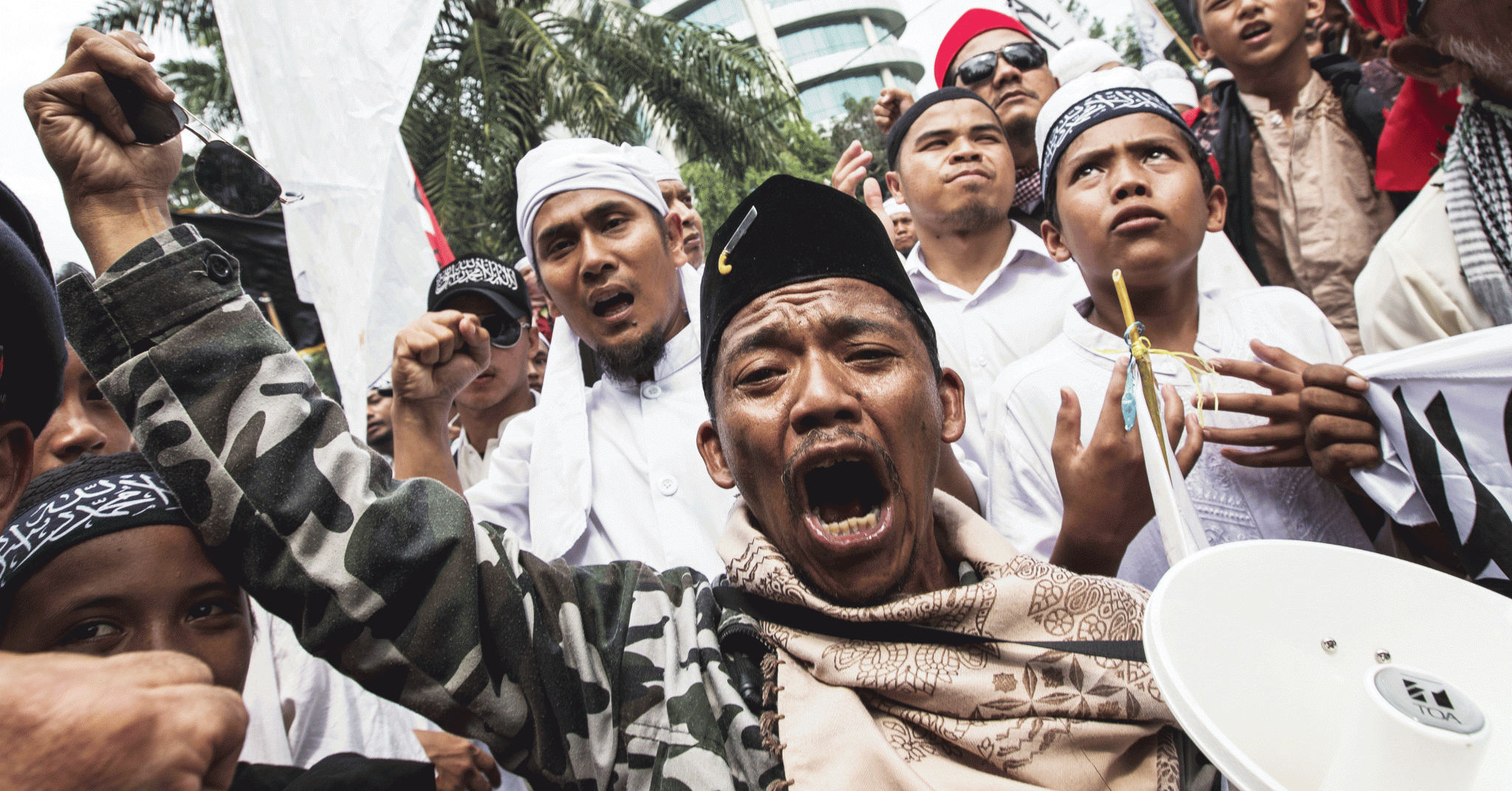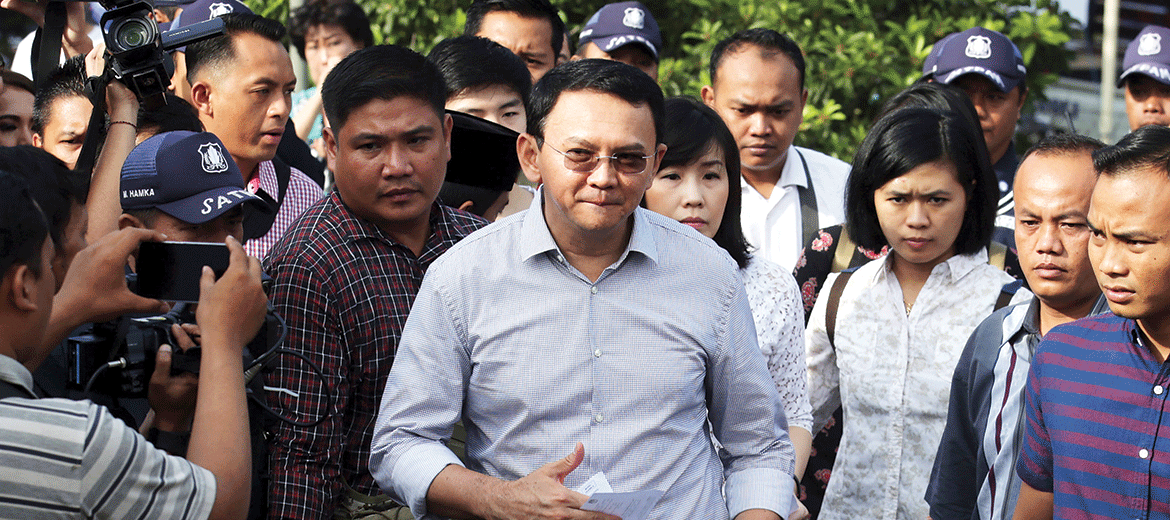A sign bearing the name and logo of Hizbut Tahrir Indonesia (HTI) on the exterior of the group’s headquarters in Jakarta is now covered in black cloth, a stark reminder of a ban handed down by the Indonesian government in July.
The group went quietly after it was deemed illegal, ostensibly due to its vision to establish a caliphate and implement sharia law – aims that the government said violated the constitution and the state ideology, Pancasila, which emphasises unity and democracy, among other tenets.
“It was our own initiative to cover the logo right after the announcement,” said the group’s spokesman, Ismail Yusanto, referring to a government press conference on 19 July during which a Justice Ministry official announced that HTI’s status as a legal entity had been revoked.
The revocation, which ended HTI’s roughly 30 years of existence in Indonesia, followed the enactment of a controversial decree issued by President Joko ‘Jokowi’ Widodo on 10 July to replace a 2013 law on mass organisation, giving him executive authority to close down organisations deemed illegal without judicial involvement.

“It must be underlined that the decree is not intended to discredit Muslim mass organisations, especially the Muslim community which is the majority in Indonesia,” Wiranto, the country’s coordinating security minister, said at the time, stressing that the decree was not an abuse of power or an attempt to limit freedom of association.
However, coming months after a wave of conservative Muslim opposition helped derail the political career of former Jakarta governor Basuki ‘Ahok’ Purnama, and with presidential elections looming in 2019, Widodo appears ready to go to battle with the country’s religious hard-right and risk tarnishing his reputation as a democrat along the way – he has already been forced to brush off questions from reporters about whether he has authoritarian ambitions.
Critics have said the decree, which does not name a specific organisation, was hastily issued and serves as a shortcut for the government to ban any mass organisations by removing 18 articles in the 2013 law. The removed articles stipulated that disbanding a mass organisation would have to be decided by the court after a due legal process.
Yusril Ihza Mahendra, a former justice minister, said removing those articles ran contrary to the original intent of the law, conceived at the beginning of the reformation era. “It was to prevent the government from abusing its power and to ensure checks and balances,” he said.
Ade Bhakti, executive director of the Jakarta-based Centre for Radicalism and Deradicalisation Studies, said that HTI’s viewpoints, compared to other radical groups, were relatively “soft” and did not pose a legitimate threat to the country, largely because they were non-violent.
“It was too risky to take such an instant measure and it could erode people’s trust in Jokowi’s image as a democratic person,” Ade said, adding that the decree may tarnish the president’s credibility as a defender of freedom of expression and association.
The risk posed by HTI, he said, “pales in comparison to the cost that Jokowi may have to pay… politically, in terms of losing support from the Muslim community as the majority in the country.”

Though Widodo’s gamble is almost certainly linked to the fate of Ahok, a close ally who is now serving jail time over a blasphemy conviction, HTI was an odd group to go after, Ade noted, given that none of its members were among the leaders of the National Movement to Safeguard the Indonesian Ulema Council’s Fatwa, which organised the mass rallies against Ahok.
“Politically, they are too minor to be considered as foe for Jokowi,” Ade said, speculating that the HTI may have been targeted for that very reason, allowing the president to test public opinion with a group that would not hit back with raucous and potentially violent protests.
Yusanto, the HTI spokesman, said he was optimistic the decree – now being reviewed by the constitutional court – would be overturned due to a lack of evidence to back the government’s claims that HTI’s teachings posed a threat so severe that it met the threshold of an emergency situtation requiring a presidential decree.
“If the court overturns the decree, it could be a backlash for Jokowi’s administration. Issuing the decree and the way it was issued were incorrect to start with,” said Idil Akbar, a political analyst from Universitas Padjajaran in Bandung, West Java.
Yusanto said that he was also counting on support from political parties that have openly declared their opposition to the decree, both for the way it was issued and the lack of democratic means in the process of disbanding organisations. Their stance on the decree will be critical in an upcoming parliamentary assembly during which lawmakers from various political factions will vote on whether to pass the decree into law and permanently replace the 2013 mass organisation law.

HTI’s lawyer and former law and human rights minister Yusril Ihza Mahendra told Southeast Asia Globe that should parliament vote against the decree, it would create a legal void on regulations regarding mass organisations, posing what Ade said was another risk to Widodo’s credibility.
“The government could be perceived as reckless in issuing a decree,” Ade said, compounding negative sentiments still festering from the Jakarta election, when Widodo and his government were widely perceived as supporting Ahok, who is Chinese and Christian – attributes that helped unite the opposition against him.
But even the mass rallies organised by Muslim groups against Ahok were well within the democratic corridor, said Idil, the political analyst. “Even Ahok at that time was not sacked from his position, and he underwent an open and fair trial,” he said, adding that the moves to ban HTI and issue the decree were just adding to an already long list of public disappointment in Widodo, including a sluggish economy and rising food prices.
But to say that Widodo is losing support from Muslims in general would be an overstatement, Idil added. “Certain Muslim groups also support the decree, such as MUI and NU,” he said refererring to the Indonesian Council of Ulemma and Nahdlatul Ulama, Indonesia’s largest Muslim mass organisation.
It’s not difficult to find members of these groups who agree with the government’s reasons for shutting down HTI. Yaqut Cholil Qoumas, leader of Ansor Youth Movement, a youth wing of NU, said they supported HTI being disbanded because of the depth with which its teachings have penetrated Indonesian society.

“They are a threat to the unitary state of Indonesia because they aspire to establish a caliphate,” Yaqut said, adding that they have members who are now bureaucrats, politicians, members of the military and police force, civil servants and employees of state-owned enterprises. According to Yaqut, these members would proselytise their ideas of a caliphate, lobbying key people to join the cause until they could eventually seize power.
“This is the pattern that Hizbut Tahrir used in Egypt and Jordan in their attempts for coup d’etat,” Yaqut said. “They don’t recognise equality for all people, as they regard non-Muslims as second-class citizens who don’t have political rights in a caliphate system.”
Yusanto, however, said that such accusations would remain no more than allegations as long as they were not proven in a court of law.
“It would not be possible to do that any more, now that the law has been replaced with the decree. The avenue to justify the allegations, to ensure fairness, is no longer there, now that the court process is eliminated,” he said. “But we are the ones being blamed as anti-Pancasila. Is it fair and just to disband an organisation without trial, without fairly proving allegations? The government obliges the people to uphold Pancasila when they don’t do that themselves.”
Yaqut rejected criticism that the decree is not democratic, saying that the government was well within its authority to issue such an order, given the pre-existing law was ineffective to quickly respond to escalating threats posed by radical Islam.
“It was a clear and present emergency situation and the government’s duty is to maintain the country’s security,” Yaqut said, adding that any parties opposing the decree still had avenues to challenge it through the constitutional court
or parliament.
Yusanto said little had changed with HTI since the axe came down on them, although he acknowledged that some members have expressed concerns over the new decree, while others have remained unconcerned because they “understand the risks of proselytising in a secular system and a repressive regime”.
“HTI never changes,” he said. “Our ideas, our ways of doing things are always the same. What is different is the regime and the regime’s reaction towards us. We may never have to change our strategy when the regime changes, since no regime
stays forever.


